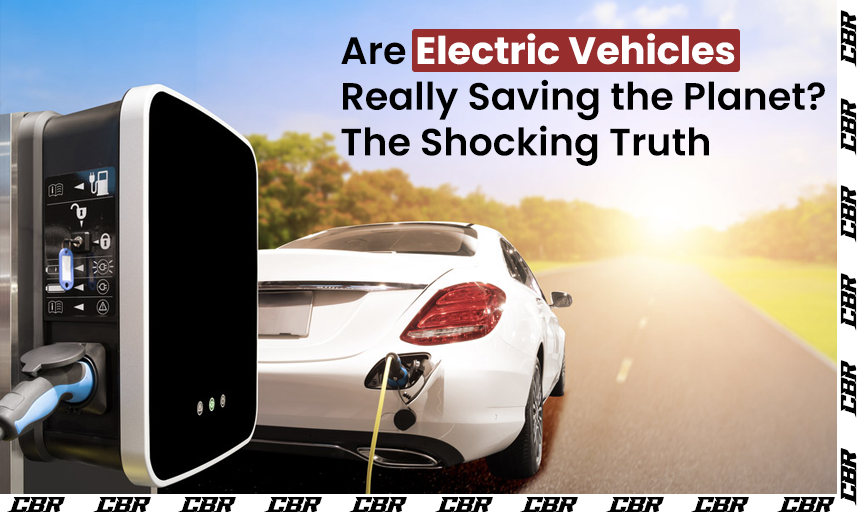From easier handling to lower running costs, owning an Electric Vehicle (EV) comes with numerous benefits. However, what truly sets EVs apart is their eco-friendliness, making them a sustainable choice for individuals looking to transition from traditional fossil fuel vehicles. With an increasing urgency for sustainable transportation, understanding the environmental impact of EVs is crucial for the health of our planet.

Are Electric Vehicles More Environmentally Friendly Than Petrol or Diesel Cars?
If you’re contemplating a switch to an electric vehicle, it’s natural to wonder about their environmental advantages. When it comes to driving emissions, electric vehicles produce zero tailpipe emissions, making them significantly cleaner than petrol or diesel cars.
Also Read: MG Windsor EV Launch: Find Out If It’s Worth the Hype! (carbikereview.com)
EVs are also more efficient than their traditional fuel-powered counterparts. The electric drive system of an EV experiences only a 15% to 20% energy loss, compared to a staggering 64% to 75% energy loss in a traditional internal combustion engine. These compelling facts underscore the appeal of electric vehicles as a sustainable option.
Environmental Benefits of Electric Vehicles
Electric vehicles are a pivotal step toward sustainable transportation, providing a cleaner alternative. Here are six key environmental benefits of EVs:
- Zero Tailpipe Emissions
Electric vehicles are recognized for their ability to produce zero tailpipe emissions. Unlike traditional Internal Combustion Engines (ICE), which burn fossil fuels and emit harmful pollutants, EVs operate without exhaust systems.- Battery Technology: Most EVs are powered by lithium-ion batteries, which do not emit pollutants during their discharge or recharge cycles. This technology allows for repeated battery usage without contributing to air pollution.
- Minimized Resource Depletion
The production process of EVs is far less resource-intensive compared to traditional vehicles, providing a substantial environmental advantage. EVs have simpler mechanics, which contributes to their resource efficiency.- Recyclability: EV batteries can be recycled, reducing the need for new raw materials and minimizing waste. This encourages greater adoption of EVs, potentially mitigating the environmental impact associated with mining and depleting non-renewable resources.
- Reduced Use of Harmful Fluids
Electric vehicles eliminate the need for fossil-based products like motor oil, commonly used in petrol and diesel vehicles. This absence significantly reduces the potential for environmental contamination.- Toxic Compounds: Motor oil used in ICE vehicles contains harmful compounds that can pollute water sources and endanger both humans and wildlife.
Also Read: Everything You Need to Know Before Buying an Electric Car in India (carbikereview.com)
- Decreased Noise Pollution
EVs contribute to reducing noise pollution, as electric motors operate much more quietly than traditional engines. This benefit extends beyond urban settings.- Quality of Life: Lower noise levels positively affect residential areas and natural landscapes, enhancing overall living conditions. As urban populations grow, embracing EVs becomes essential for promoting quieter surroundings.
- Use of Eco-Friendly Materials
Beyond operational advantages, EV manufacturers are increasingly incorporating eco-friendly materials in their vehicle structures. This trend minimizes environmental impact during both production and usage.- Natural and Recycled Materials: Utilizing sustainable materials instead of metals and plastics is critical for preserving the environment.
- Advancements in Clean EV Battery Technology
Continuous improvements in EV technology are significantly reducing the carbon footprint associated with batteries. Recent developments have lowered the carbon trace of EV batteries to 2-3 times less than previous levels.- Renewable Energy in Production: EV manufacturers are increasingly requiring their battery suppliers to use renewable energy sources during production, further enhancing sustainability.
Table: Comparison of Environmental Impacts
| Factor | Electric Vehicles (EVs) | Petrol/Diesel Vehicles |
|---|---|---|
| Tailpipe Emissions | Zero | High (Harmful pollutants) |
| Energy Efficiency | 15%-20% loss | 64%-75% loss |
| Use of Harmful Fluids | Minimal (no motor oil) | Requires various lubricants |
| Noise Pollution | Low (quieter operation) | High (noisy engines) |
| Material Use | Eco-friendly materials | Often unsustainable materials |
| Battery Production | Cleaner production practices | Traditional methods (higher carbon footprint) |
Moving Towards a Sustainable Future
The transportation sector significantly impacts the environment, contributing to resource depletion, air pollution, and climate change. Electric vehicles offer a promising solution to these urgent environmental challenges.

EVs require fewer natural resources for production, paving the way for the use of renewable materials and reducing resource depletion. A substantial decrease in greenhouse gas emissions is possible by charging EVs with electricity sourced from renewables. Achieving a successful transition to EVs and fully utilizing their environmental benefits will require a collaborative effort.

Conclusion
Electric vehicles play a vital role in steering society away from fossil fuels toward cleaner, renewable energy sources. Choosing to buy an electric car is a commendable step toward a sustainable transportation solution.
Also Read: MG Windsor EV Launch: Find Out If It’s Worth the Hype! (carbikereview.com)
As you make this eco-conscious choice, don’t forget the importance of securing Electric Car Insurance. Shriram General Insurance offers affordable Comprehensive and Third-Party Insurance plans for electric vehicles, ensuring both protection and sustainability in your transportation choice.








